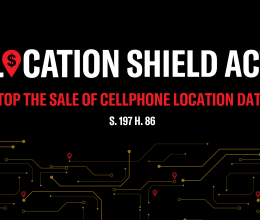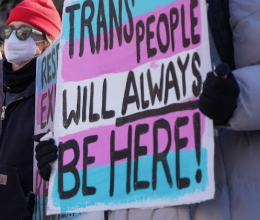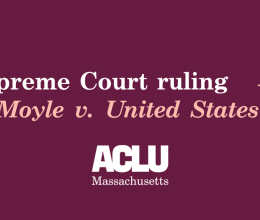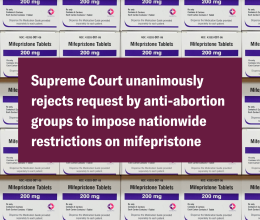
At the Massachusetts State House, reproductive advocacy groups, abortion care providers, representatives from Massachusetts’ abortion funds, privacy and technology experts, LGBTQ+ organizations, labor unions, and others today called on state lawmakers to ban the sale and trade of cellphone location data.
During the hearing of the Joint Committee on Consumer Protection & Professional Licensure, advocates — including from the ACLU of Massachusetts, Reproductive Equity Now, Planned Parenthood League of Massachusetts, AFL-CIO, Anti-Defamation League New England, TransHealth, and more — testified in strong support of the Location Shield Act (H.357/S.148).
The Location Shield Act, sponsored by Representative Kate Lipper-Garabedian and Senator Cynthia Creem, would prohibit companies from engaging in the predatory practice of selling location data, while still allowing them to collect and process this data for legitimate purposes with user consent. According to a new ACLU/Beacon Research poll, 92 percent (92%) of Massachusetts voters support this reform.
Our cellphones constantly keep track of where we go; many apps collect location information even when they are not being actively used. Location data is associated with each individual phone and is therefore inherently personal information; if someone knows where a device is most nights and where it goes during the day, they know a person’s home and work addresses, and therefore that person’s identity. Third-party data brokers are allowed to buy this personal information, repackage it, and then sell it to anyone with a credit card — without any federal or state laws to stop it.
This predatory industry puts millions of people across Massachusetts at risk. In the aftermath of the Supreme Court’s decision overturning Roe v. Wade, for example, journalists found that data brokers have continued to buy, repackage, and sell the location information of people visiting sensitive locations including abortion clinics. Cellphone location data can also be sold to people seeking to cause harm such as domestic violence or stalking, bias-motivated violence or harassment, or threats to public safety officers or government security.
The following comments are from:
State Representative Kate Lipper-Garabedian (D-Melrose): "As someone who cares deeply about the right to personal privacy, I was proud to file the Location Shield Act. By prohibiting the sale of location data, this legislation would ensure that all persons in the Commonwealth are afforded agency, autonomy, and safety in their day-to-day lives with the places they go and where they live private and secure from third-party interests. The law further will have particular value for individuals from marginalized groups and persons seeking to access services protected in the Commonwealth that are under attack elsewhere like abortion care."
State Senator Cynthia Creem: “Our personal location information can reveal sensitive and intimate details about our lives and should not be monetized and made available to the highest bidder. More importantly, allowing the sale of this information can also place people's lives at risk. This is especially true in the case of persons seeking access to abortion and their health care providers. Last session we worked to safeguard providers by allowing them to participate in a state address confidentiality program. Passage of this bill will also build upon those efforts by not allowing anti-abortion extremists to utilize cellphone location data to bypass these protections.”
Carol Rose, Executive Director of the ACLU of Massachusetts: “Every day, companies collect and sell sensitive location information from cellphones, revealing where people live, work, seek health care, and more. Anyone can buy this data – anti-abortion extremists, anti-LGBTQ organizations, foreign governments, and more – and use it to harm us. To protect our privacy, safety, and access to essential health care, Massachusetts needs to stop this practice now.”
Claire Teylouni, Director of Government Affairs at Reproductive Equity Now: “In the last year since the Supreme Court overturned Roe v. Wade, Massachusetts has acted boldly to protect access to abortion and shield our state’s heroic providers from hostile out-of-state litigation. But, as anti-abortion extremists continue to ramp up attacks on our rights, our work is not done. In a world where so much of our lives are lived online, we’re not fully protected until our digital privacy is protected. We know that data brokers have already bought, repackaged, and sold the location data of people visiting abortion clinics. Anyone with a credit card, including anti-abortion extremists in states with bans, can purchase this data and use it to target abortion patients and providers. Now, one year post-Dobbs, Massachusetts has an opportunity to ban the sale of our location data before it’s used to criminalize people seeking reproductive health care in our Commonwealth.”
Emily Niejadlik, registered nurse and RN manager at Planned Parenthood League of Massachusetts: "The possibility that one's location data could be sold and fall into the hands of people with an anti-abortion agenda is scary, and could deter patients from seeking needed health care. By limiting the collection and accessibility of location data, we can safeguard the privacy and security of health care workers, and abortion providers can give patients greater confidence that when they come through our doors, they are safe and their medical decisions will remain between them and their doctor."
Chrissy Lynch, Massachusetts AFL-CIO Secretary-Treasurer: “Right now, some employers can track their workforce's every move – at work and when they are off the clock. Women, people of color, and immigrants are especially at-risk. Invasions of privacy have led to the unfair treatment of workers for generations. As our economy becomes more digital, it is imperative that the state takes action to protect the privacy of working people and make sure that digital information cannot be inappropriately captured or used. The Location Shield Act does exactly that."
Rabbi Jonah Steinberg, Anti-Defamation League New England Regional Director: “Banning the sale of private cellphone location data will protect vulnerable people across the Commonwealth from extremist threats such as swatting and doxing. ADL is proud to support this important legislation to address antisemitic, white supremacist, and anti-LGBTQ+ activity that is increasingly targeting individuals, gatherings, communities, and their physical spaces.”
The ACLU of Massachusetts and partners recently launched "Your Location: It’s None of Their Business," a campaign calling on lawmakers to pass the Location Shield Act and ban the sale and trade of personal location information.






